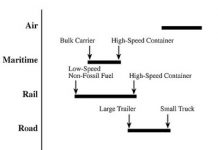by Debra Fiakas CFA
A long article appearing in early March 2014 on Biofuels Digest about Emerging Fuels Technology (EFT) gave me pause. The article has since been removed from the site but it was an interesting primer on Oklahoma-based EFT’s use of the Fischer-Tropsch process to convert carbon-based feedstock to liquid fuel, otherwise called Gas-to-Liquids. While Emerging Fuels Technology has been listed in Crystal Equity Research’s Alternative Chemicals Group of the Beach Boys Index of companies trying to harness energy from the sun through biomas, I must admit the company had not been taken seriously.
There are reasons for my apathetic view.
Fischer-Tropsch often referred to as FT for short is a series of chemical reactions to convert carbon monoxide and hydrogen into liquid hydrocarbons. The reactions are triggered by a catalyst, usually cobalt or iron, and managed under high temperatures in a chamber or reactor. The idea is quite beguiling: converting biomass or coal or even natural gas, especially stranded natural gas, to something useful like a liquid fuel. Unfortunately, FT is expensive, requiring significant capital to build the reactor and attendant gasification, water handling, and fuel distribution systems. Operating costs are not cheap either as all those systems require people to watch over them regular maintenance and repair. Then there is the cost of replacing the catalyst when it wears out!
However, the Biofuels Digest article suggested EFT had achieved important efficiencies with its catalysts that could reduce the high costs of building and operating a FT-based gas-to-liquids plant. EFT had managed to forge a partnership with an engineering firm Black & Veatch that specializes in the energy field and has worldwide reach. Then at the end of 2014, EFT signed a memorandum of understanding with Airbus Group (AIR: Paris), which has made clear its interest in developing alternative aviation fuels.
Some investors might remember one of the most high profile developers of FT, Rentech, Inc. (RTK: Nasdaq). Rentech exited the field with the 2013 shuttering of a demonstration plant in Colorado and the sale of property near Natchez, Mississippi that was to be the site of Rentech’s first gas-to-liquids production facility. In winding down its gas-to-liquids development effort, Rentech indicated it would retain and protect its portfolio of patents. Rentech owns a group of patents on FT-related technologies that purportedly improved upon the basic FT processes developed back in the 1920s. Rentech also claims an effective, proprietary catalyst and tweaks to both the preliminary gasification and final refinement steps. Even with all that innovation at its displosal Rentech elected mothball its efforts. Over the last couple of years Rentech has morphed into a producer of wood pellets and a provider of wood chipping services to industry. The company also has interests in nitrogen fertilizer production through its ownership in Rentech Nitrogen Partners LP (RNF: NYSE).
Rentech voluntarily threw in the towel, but Germany-based Choren Industries was forced into bankruptcy as development costs and construction delays burned up capital resources. After synthesizing the first liquid fuel from wood in a laboratory in 2001, and then building a commercial-scale plant in 2008, Choren stubbed its toe on its first large-scale ‘biomas-to-gas-to-liquids’ facility that was to have had the capacity to process 250 million liters of liquid fuel per year. Like Rentech, the surviving Choren Industries has a series of international patents to commemorate its multi-stage gasification and fuel synthesizing process that the company still puts to use in protecting its gasification services.
Wood pellets and nitrogen are a long way from gas-to-liquids technologies. Holders of RTK shares have found themselves short of a play on alternative or sustainable energy. Unfortunately, for investors there is no investment play in EFT or any of its admirers either. EFT is a private company that provides very little information to the public about its financial situation. Its technology development and licensing business model may not require as many trips to the capital markets as an investor might expect from a company with plans to build production facilities. On a trim operating and investment budget, EFT can remain quietly private for some time. Assuming of course that EFT does not end up in the weeds like Rentech and Choren.
Debra Fiakas is the Managing Director of Crystal Equity Research, an alternative research resource on small capitalization companies in selected industries.
Neither the author of the Small Cap Strategist web log, Crystal Equity Research nor its affiliates have a beneficial interest in the companies mentioned herein.








